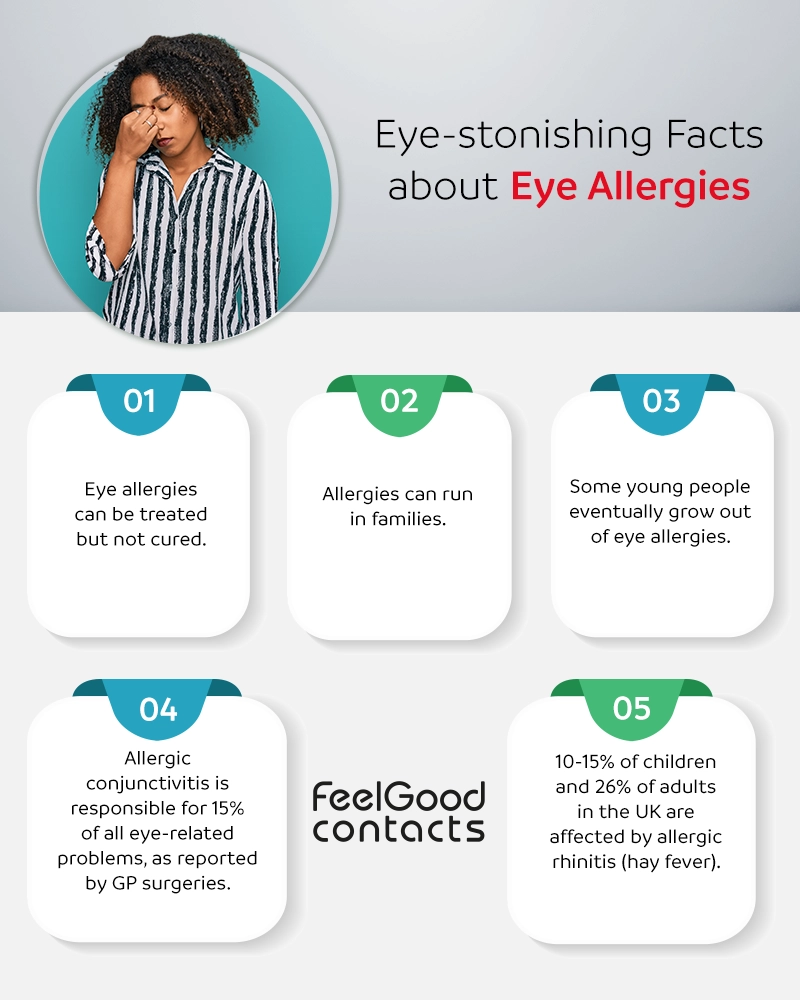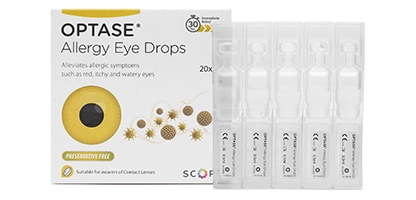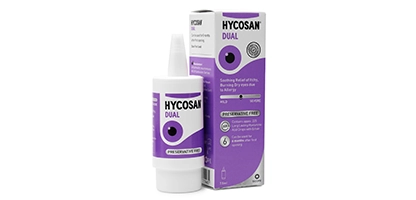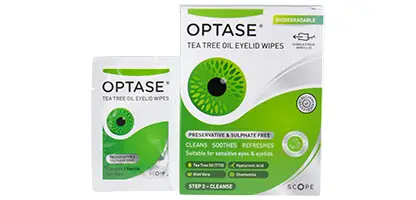Also referred to as allergic conjunctivitis or ocular allergies, eye allergies are usually sparked by the same irritants that cause sneezing, a runny nose, itchiness, and other allergy symptoms. Common airborne allergens include dust, pollen, pet dander and mould. When these irritate the conjunctivitis and eyelids, an eye allergy occurs. Unlike some other types of conjunctivitis, eye allergies do not spread from person to person.
Certain cosmetic products, makeup, and eye drops can also cause eye allergies. It is essential to test products with small drops before using them in full. It is also recommended to read product labels and consult with an eye care professional if there are any doubts or concerns. Preservative-free eye drops are also advisable as they are less likely to cause irritation.

Eye allergy symptoms
The symptoms of an eye allergy can include the following:
- Red eyes
- Blurry vision
- Swollen eyes
- Itchy eyes
- Light sensitivity
- Tearing/watery discharge
- A burning sensation in the eye
- A foreign body sensation (feeling like there is grit or dirt in your eyes)
- Puffiness
Eye allergies can sometimes be accompanied by other symptoms, such as nasal allergies, which may cause an itchy or stuffy nose and sneezing. Additionally, eczema can also be present in some cases. However, eye allergies can also occur independently without any other symptoms.
Eye allergy triggers
There are a variety of eye allergy triggers, including:
- Outdoor allergens - pollen
- Indoor allergens - pet dander, mould, dust mites
- Irritants, such as perfume and cigarette smoke
How to deal with eye allergies – management and treatment
Though you may not be able to avoid an eye allergy altogether, you can take several measures to reduce its symptoms.
You can limit your outdoor exposure by:
- Checking the pollen count every morning to assess your risk of allergies. The pollen count is usually highest in the mid-morning or early evening. Many individuals experience seasonal allergies during spring when the pollen count is high. This is often referred to as hay fever. Studies reveal that up to 49% of the UK population suffers from hay fever symptoms.
- Staying indoors or avoiding areas with open fields of grass and flowers where the pollen count is high.
- Wearing eyewear, such as glasses, can protect your eyes and help prevent pollen from getting in. Wraparound frames are a good choice as they provide more coverage and protection against airborne particles, pollen, and other allergens. Oversized sunglasses are also a good option as they cover a wider surface area.
You can limit your indoor exposure by:
- Mopping floors with a damp mop instead of dry dusting, as it is more effective in limiting exposure to dust mites.
- Washing your bedding regularly with hot water to prevent dust mites from accumulating. This also helps to keep your bedding clean and fresh, ensuring a good night's sleep.
- Minimising dampness and maintaining cleanliness in areas prone to mould growth to eliminate any mould.
- Investing in a HEPA filter for your air conditioner, as it can help trap any mould spores that may irritate your eyes.
- Purchasing air purifiers with an allergy-trapping filter for your heating/cooling system.
You can limit your exposure to eye allergies caused by pets by:
- Keeping yourself safe from germs and bacteria by always washing your hands thoroughly after touching any animal.
- Washing your clothes after visiting friends with pets.
- Keeping your pets out of the bedroom to avoid exposure to pet dander while sleeping.
- Replacing carpeted floors with linoleum, tile or wood, as they are easier to clean and less likely to trap pet dander and allergens.
Eye allergy diagnosis
Eye allergies have symptoms similar to those of certain eye conditions, making it crucial to get an accurate diagnosis and identify the root cause. An allergist or ophthalmologist can conduct tests to reveal whether these shared symptoms are the result of an eye allergy.
An eye allergy diagnosis may involve examining the eye with a microscope to see swollen blood vessels on the surface of the eye. The ophthalmologist might also take a culture scraping from the conjunctiva to test for a certain type of white blood cells that signify an eye allergy.
How do you get rid of eye allergies?
You may not be able to get rid of eye allergies for good; however, prescription eye drops and medications can reduce the symptoms. Your doctor may prescribe the following, as well as eye drops for allergies:
- Non-sedating oral antihistamines (please note, these may dry your eyes and can make your symptoms worse)
- Allergy shots, also known as immunotherapy, involve injecting small amounts of the allergen over a period to strengthen an individual's immune system against the allergen
How to manage eye allergies
Here are certain ways to manage eye allergies:
- Carrying an eyewash kit is a good idea if you need to rinse your eyes.
- Switching to daily contact lenses during allergy season, since they can be discarded after one use, reducing allergen and debris build-up.
- Using Optase Allergy Eye Drops or Hycosan Dual Eye Drops, as they are both effective in soothing eye irritation and can be used with or without contact lenses.

 Offers
Offers Account
Account
 Favorite
Favorite
 Basket
Basket

 OFFERS
OFFERS




















